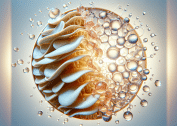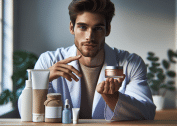Curious about collagen and its real impact on skin? Discover surprising truths about collagen, how it interacts with your wellness routine, and factors that influence skin vitality. This article unpacks what science says about natural collagen production and offers approachable insights for anyone invested in beauty and wellness.
The Role of Collagen in Skin Health
Collagen is the most abundant protein in the human body, responsible for giving skin its firmness and elasticity. Many people associate it with youthful skin and a radiant appearance. As the years pass, the skin’s collagen matrix slowly depletes, leading to typical signs of aging such as wrinkles, sagging, and dryness. Researchers agree that supporting natural collagen health is a significant factor in maintaining a youthful complexion, even as the body undergoes inevitable changes (Source: https://www.ncbi.nlm.nih.gov/pmc/articles/PMC3583892/).
The body builds collagen using amino acids from protein-rich foods and vitamins such as C and E. These nutrients provide the building blocks for skin repair and regeneration. However, environmental factors like sun exposure, pollution, and even stress can accelerate collagen breakdown, impacting overall skin texture. While some individuals try external treatments, daily habits such as balanced nutrition, hydration, and sunscreen remain vital for keeping collagen synthesis optimal within the skin layers.
For many, collagen is seen only in the context of wrinkles, but its role in skin health extends to supporting moisture retention and smoothness. This multifunctional protein also assists in wound healing and overall resiliency. Understanding how to naturally support collagen levels, whether by prioritizing nutrient density or moderating lifestyle risks, is foundational for holistic skin wellness and beauty.
What Impacts Collagen Production?
Collagen production is not simply about genetics; it’s also shaped by daily choices and environmental exposures. Sun exposure, for example, can accelerate collagen breakdown through the action of ultraviolet (UV) light, which damages the protein matrix responsible for skin strength (Source: https://www.aad.org/public/everyday-care/sun-protection/sunscreen-for-your-skin-type). Similarly, tobacco smoke and high sugar intake have been shown to impact normal collagen formation negatively. Adopting protective routines, such as seeking shade, using protective clothing, and choosing a balanced diet, can play a role in slowing this natural process.
Sleep and stress management are sometimes overlooked but are crucial to supporting the body’s restoration mechanisms. During deep rest, the body rebuilds proteins—including collagen—while stress hormones like cortisol can slow synthesis. Finding moments for relaxation, regular sleep, and adopting calming routines become indirect, yet powerful, tools in supporting skin wellness and overall appearance.
Beyond daily habits, age remains a natural factor, but it is modifiable through healthy living. As the skin matures, collagen regeneration gradually slows, which can lead to visible changes such as thinning and loss of firmness. While reversal is not possible, approaches that foster skin resilience can help maintain a smoother and brighter complexion over time.
Myths and Truths About Collagen Supplements
Collagen supplements have sparked global curiosity, with many wondering if ingesting collagen peptides really makes a visible difference. Scientific studies offer mixed results: some suggest that collagen peptides may help skin hydration and elasticity, while others say more research is needed to confirm benefits (Source: https://www.hsph.harvard.edu/nutritionsource/collagen/). Key factors, such as the form of supplement, individual diet, and bioavailability, play important roles in real-world outcomes.
It’s also important to remember that collagen is broken down into amino acids during digestion, so the body can’t always direct those fragments straight to the skin. Instead, overall protein intake and excellent nutrition remain paramount. For those who do choose enhanced products, looking for formulations backed by research and understanding personal health status is wise. Supplements are not universally necessary and may not be a solution for everyone.
Many beauty trends present collagen as a miracle ingredient, but real skin transformation is rarely instant. For most people, supporting wellness with a consistent routine of nutrient-rich foods, movement, and mindful skin care provides more holistic and gradual improvement. Exploring the supplement option should be individual and, ideally, discussed with a medical or nutrition professional.
Natural Approaches to Support Collagen
Diet remains one of the most powerful tools for preserving the collagen network. Foods rich in vitamin C—such as citrus, berries, and leafy greens—play a central role in collagen synthesis (Source: https://www.hsph.harvard.edu/news/hsph-in-the-news/collagen-hype-can-eating-it-make-your-skin-supple/). Additionally, high-quality protein from fish, poultry, legumes, and beans supplies the body with vital amino acids. Integrating antioxidants from fresh fruits and vegetables supports cell resilience and helps neutralize substances that could damage skin proteins.
Staying well-hydrated is another underestimated part of supporting skin’s plumpness and barrier function. Water and electrolytes allow cells to function efficiently, helping skin maintain a supple and refreshed look. Hydration helps regulate many bodily processes—especially when combined with consistent routines in sleep and physical activity. These subtle lifestyle shifts can make a surprising difference over time.
Physical activity, including both resistance training and gentle movement, may indirectly support collagen maintenance by promoting circulation and tissue health. Exercise helps nourish skin cells and pull nutrients efficiently through the body. Pairing motion with sun protection methods, such as applying broad-spectrum sunscreen and wearing hats, completes a sound natural strategy for skin preservation in the wellness and beauty routine.
Innovations and Clinical Treatments for Collagen Support
Dermatological treatments targeting collagen are expanding, with modalities like microneedling, laser therapy, and ultrasound emerging as options for stimulating the skin’s natural repair processes. Microneedling, for example, works by creating gentle micro-injuries that prompt new collagen development in the skin layers (Source: https://www.ncbi.nlm.nih.gov/pmc/articles/PMC4976400/). While promising, these methods are most effective when supervised by skin health professionals and considered as part of a comprehensive approach combining self-care and professional expertise.
For those interested in noninvasive techniques, topical treatments containing retinoids or peptides have been shown to encourage mild collagen renewal in some individuals. These creams and serums can offer a subtle boost in skin smoothness and tone, especially when used as part of a consistent routine. Selecting products with proven active ingredients and verified research is pivotal for those wanting supported outcomes.
Clinical research continues to investigate the safety, effectiveness, and accessibility of new technologies aimed at promoting collagen. Studies often underscore the value of setting realistic expectations, as improvement tends to be gradual and personalized. Consulting dermatologists for suitability and tracking progress over months—rather than days—provides the foundation for safe, ethical, and effective use of advanced skin treatments.
Everyday Habits That Influence Collagen Longevity
Small daily actions influence skin’s health far more than one-off treatments. Smoking cessation, limiting sugar consumption, and moderating alcohol all protect the body’s ability to renew proteins, including collagen (Source: https://www.cdc.gov/tobacco/campaign/tips/diseases/skin.html). Regular exercise, adequate hydration, and prioritizing restorative sleep carry huge benefits. These patterns accumulate over time, buffering skin from avoidable stress and enhancing natural regeneration.
Gentle cleansing, consistent moisturization, and avoidance of harsh chemicals are part of foundational skin care. Products formulated for sensitive skin and fragrance-free options support the outer barrier and lessen irritation that could undermine skin structure. Even thoughtfully planned makeup removal contributes to preserving skin comfort, strength, and luminous appearance.
Community awareness of the benefits of wellness practices—such as mindful eating and conscious movement—has grown. Resources available from reputable dermatology and skin health institutions offer further guidance for forming supportive routines. Simple wall calendars, digital health trackers, or group wellness challenges can help individuals build habits that truly benefit their skin’s collagen in the long run.
References
1. Shuster, S. et al. (2013). The Science of Collagen: Structure and Function. Retrieved from https://www.ncbi.nlm.nih.gov/pmc/articles/PMC3583892/
2. American Academy of Dermatology Association. (n.d.). How to Safely Get Vitamin D From Sunlight. Retrieved from https://www.aad.org/public/everyday-care/sun-protection/sunscreen-for-your-skin-type
3. Harvard T.H. Chan School of Public Health. (n.d.). Collagen. Retrieved from https://www.hsph.harvard.edu/nutritionsource/collagen/
4. Harvard T.H. Chan School of Public Health. (n.d.). Collagen Hype: Can Eating It Make Your Skin Supple? Retrieved from https://www.hsph.harvard.edu/news/hsph-in-the-news/collagen-hype-can-eating-it-make-your-skin-supple/
5. Alam, M. et al. (2016). Micro Needling: A Review and Practical Guide. Retrieved from https://www.ncbi.nlm.nih.gov/pmc/articles/PMC4976400/
6. Centers for Disease Control and Prevention. (2023). Tobacco Use and Skin. Retrieved from https://www.cdc.gov/tobacco/campaign/tips/diseases/skin.html









